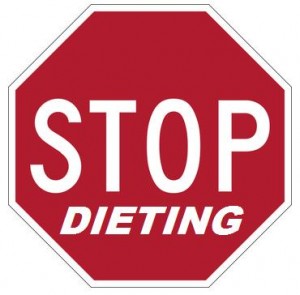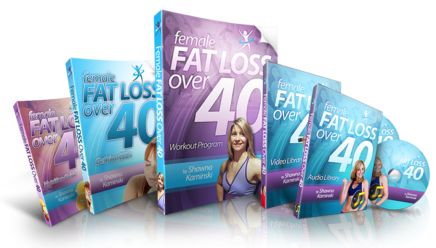4
Jan 13
January is here and I know that many of you are starting to think about ‘going on a diet’.
I want you to STOP right now and re-think this whole ‘diet’ idea.
Let me tell you what happens when you go on a diet. I know you’ve probably read it before, but it’s more important than ever to review this right now when you’re ready to pull the trigger on something unhealthy.
First of all, a diet implies a temporary state versus a long-term solution. If you go on a diet, you’ll surely come off it and you know what that means…usually a return of all the weight lost and then some.
So rather than going on a diet, why not consider making a few healthy changes (read about them here and here) and slowly morph your eating habits to support long term weight loss.
Here’s another problem: What happens when you reduce your calories and your weight loss plateaus? Often times, this is an indication that more caloric reduction is required in order to continue losing weight.
Let me tell you how wrong this is. If you’ve plateaued, it means that your metabolic rate has slowed down. You’re burning LESS calories since your body is incredibly efficient. You’re giving your body less fuel, so your body gets by on less. This is a great survival mechanism when in a famine situation, even if it’s a self induced famine.
Food is plentiful and when you fall off the famine wagon and start to eat with wild abandon (or even a reasonable amount), your body will soak up those calories to store for the next famine. Your body is reluctant to give up any fat because it’s planning for the next famine. So not only will you NOT lose weight, your chances of gaining MORE weight are higher since you’ll basically eat the same amount as you did before your diet, but you’ll be gaining weight due to a slower metabolism.
No one wants her metabolism to slow down…
Another problem with reduced calories is reduced nutrition. Often times you’ll have difficulty meeting your body’s requirements for all the nutrients necessary for healthy living on a low calorie diet.
Another strike against diets.
And the third strike is this: When you go on a diet, you’re going to have severely reduced energy levels, which means you won’t be able to work out as hard or as long as you normally would.
This results in less calories being burned per day, again slowing down weight loss.
If you want a perfect way to slow weight loss down, go on a diet, go hungry, starve yourself.
Ready for some good news?
There’s no need for starvation type diets. Effective and long-term weight loss can be achieved with eating more AND doing more.
Increasing caloric output is essential. The most effective exercise for weight loss includes HIIT and strength training. Don’t do one without the other. Here’s why:
HIIT (or high intensity interval training) is all about short and intense metabolism boosting exercise. The glory of HIIT workouts is that in a very short time, (as little as 10 minutes) you can raise your metabolism significantly so that the calorie burning effects of the workout actually extends PAST the training time. Stop working out but you’ll continue to burn calories after HIIT. Now that’s a sweet deal.
The trick with HIIT though is that you have to get hot and sweaty. You have to really work hard. Tabata training is an example of this. You can read all about tabata training here.
Next up is strength training. This is essential, especially for women in our forties. Over time, many women have traded muscle for fat. You may weigh the same (if you’re lucky), but your body composition has changed. Muscle is metabolically active so when you lose muscle, you lose the metabolism burning effects. Maintain or even gain a bit of muscle and you’ll boost your metabolism. And don’t worry that you’ll pack on the beef with strength training. Women will NOT get beefy and overly muscular without performance enhancing drugs. Plain and simple. (If you only knew the amount of weight I hoist, you’d understand that you can pick up the 15-20 lb dumb bells and not worry about bulk.) Read more about fitness myths here.
As for eating more, well that sounds like good news doesn’t it?
Here’s a trick:
START AND STOP eating before your body gives you telltale signs.
Be a little pre-emptive with your eating. What I mean by this is START to eat a little bit BEFORE you get famished so to avoid overeating.
Then, STOP eating BEFORE you get full. It takes your belly about 20 minutes to get the message to your brain that it’s full. By this time, you may have over eaten. So stop eating when you feel comfortable, eat slowly and listen to your body.
When you’re eating nutritionally dense food at regular intervals, every 2-3 hours, your body will react positively. It will know it’s ‘safe’ to burn the calories ingested (and even some stored fat) because it will know more fuel is on the way. Your energy levels will be higher so that you’ll feel more energized to workout and actually expend calories. It’s win-win.
Proper eating isn’t rocket science, read more about some tips here.
If you need a plan for the New Year, now’s the time to get set up.
Take a look at my program here. You’ll be covered with workout plans, nutrition plans, motivation and more.
But by all means DON’T go on a diet this January.








 My passion is teaching people how to work fitness into their daily lifestyle in order to improve their quality of life. Let’s work together to help you reach your fitness goals!
My passion is teaching people how to work fitness into their daily lifestyle in order to improve their quality of life. Let’s work together to help you reach your fitness goals!
[…] Planning on going on a diet this January? Maybe you should rethink that idea. Female Over Fat Loss Over 40 Expert, Shawna K, tells you why. […]
[…] Planning on going on a diet this January? Maybe you should rethink that idea. Female Over Fat Loss Over 40 Expert, Shawna K (me!), tells you why. […]
[…] Planning on going on a diet this January? Maybe you should rethink that idea. Female Over Fat Loss Over 40 Expert, Shawna K, tells you why. […]